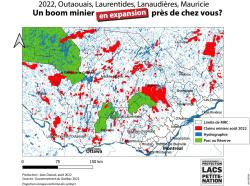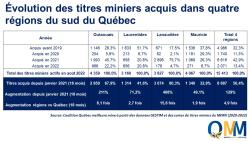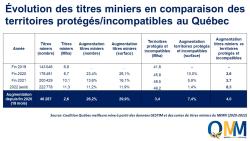(Montreal) In a new map released today, a coalition of local and national organizations reveals a boom in mining claims ranging from 49.1% to 408% for 18 months in four tourist regions of southern Quebec. Faced with this unprecedented boom, the coalition is urging Quebec to establish a moratorium, as long as the rules set out in the Mining Act have not been modified.
This boom in mining claims comes on the heels of increased global demand for minerals and the launch of the Quebec Plan for the Development of Critical and Strategic Minerals ("Minerals of the Future") in the fall of 2020.
Among the highlights noted by the organizations:
- A rate of increase 4.9 times faster than the rest of Quebec - The largest increase in mining claims was observed in Lanaudière (408%), followed by the Outaouais (211%), the Laurentians (71.2%) and the Mauricie (49.1%). This represents an average increase of 129%, which is 4.9 times higher than the 26.2% increase observed throughout Quebec during the same period.
- Near parks and in major wildlife reserves - Hundreds of claims are directly adjacent to major national and regional parks (Mont Tremblant, Lac Taureau, etc.), while others are located within major wildlife reserves (Papineau-Labelle, Lavérendrye, etc.), all of which are managed by the Société des établissements de plein-air du Québec (SÉPAQ)
- A rate of increase 4 times greater than for protected areas - At the level of Quebec, the 29.9% increase in the area now covered by mining claims since January 2021 (rising from 8.7 to 11.3 million hectares) is 4 times greater than the 7.4% rate of increase during the same period for protected areas and areas classified as incompatible with mining activities (45.8 to 49.2 million hectares)
- An area as large as Belgium, Denmark, and Switzerland combined - Quebec is vast and although the area of its territory covered by mining claims today seems small (6.8% of the territory or 11.3 million hectares), it is in fact equivalent to 20.4 million soccer fields or the total area of Belgium, Denmark, and Switzerland combined.
- A population that has not been informed or consulted - Despite the 25 municipalities currently organized in the Outaouais and Lower Laurentians regions, very few citizens and communities are aware of the current mining claim boom taking place under their feet. Nothing in the Mining Act obliges companies to inform or consult citizens, municipalities, or Indigenous communities before acquiring new mining claims on their territories.
Faced with this wave of mining claims sweeping over southern Quebec in a chaotic manner, without planning and without consulting local populations, organizations are urging Quebec to establish a moratorium. In a letter sent to the government, they ask in particular to review the Mining Act and the rules of application of “territories incompatible with mining activity” (TIAM) in order to better protect tourist areas and valued natural environments.
This call echoes the some 25 municipalities currently mobilized in southern Quebec, as well as another request made earlier this year concerning the need to protect drinking water eskers in Abitibi-Témiscamingue.
It should be noted that a recent Léger poll underlines that 3 out of 4 people in Quebec (78%) say they are in favour of "requiring the consent of local populations (e.g., municipalities, Aboriginal Nations) before authorizing any mining activity on their territory. A similar proportion (75%) asks “to prohibit any mining project in tourist or resort areas”. Almost all (89%) of respondents want to “prohibit the dumping of mining waste into any lake, river or sensitive ecological environment”.
For information :
- Louis St-Hilaire, Group for the protection of the lakes of the Petite-Nation (514) 591-9167
- Alice de Swarte, Canadian Parks and Wilderness Society - CPAWS Quebec (514) 575-4941
- Rébecca Pétrin, Eau Secours (514) 246-9075
- André Bélanger, Rivers Foundation (514) 272-2666, 301
- Martin Vaillancourt, National association of regional environmental councils (418) 265-7545
- Ugo Lapointe, Coalition Quebec Meilleure Mine (514) 708-0134
Supporting this request (alphabetically):
- Association pour la protection du lac Taureau (APLT)
- Association québécoise des médecins pour l'environnement (AQME)
- Centre de recherche en éducation et formation relatives à l’environnement et à l’écocitoyenneté (Centr’ERE)
- Coalition Québec meilleure mine
- Eau Secours
- Fondation Rivières
- Nature Québec
- Regroupement national des conseils régionaux de l’environnement (RNCREQ)
- Regroupement pour la protection des lacs de la Petite-Nation
- Société pour la nature et les parcs - SNAP Québec
- SOS - Grenville-sur-la-Rouge
Quotes:
What our map shows is much worse than we could imagine. We are currently witnessing the appropriation of vast swaths of southern Quebec by the mining exploration industry. This is happening without the citizens knowing about it and having a say. At this rate, we will soon be faced with a fait accompli. Quebec will become the Alberta of minerals.
- Louis St-Hilaire, Group for the protection of the lakes of the Petite-Nation
Abitibi is built on a boom in mining claims 100 years ago, a boom that has continued to expand since, without consulting the population, in the total chaos of the Mining Act. Forty percent of the Abitibi territory is now "frozen" due to mining claims, preventing any other use of the territory. Southern Quebec should not suffer from this archaic policy.
- Richard Desjardins, Boreal Action
The government and the mining industry do a lot of publicity about minerals of the future. But in this case, it is also our future that is in question and we would like to have a say on the subject. For the moment, we are not listening to the government and we are afraid of becoming a sacrificed region.
- David Pharand, Mayor of Duhamel
“Quebec cannot move forward with so-called “future” minerals with laws and practices of the past. We must put health and the environment back at the heart of current mining laws and policies”
- Ugo Lapointe, Coalition Québec meilleure mine
- “Environmental protection is the basis of a responsible and competitive mining industry. Quebec has many assets to position itself as a leader, but it must not give in to urgency. The government must achieve environmental objectives and also ensure the social acceptability of projects with host communities.”
- Martin Vaillancourt, Regroupement national des conseils régionaux de l’environnement
“In 2022, it is high time to stop considering the natural environments of Quebec as a simple reservoir of industrial resources to be exploited. Reserving large swaths of inviolate nature for our physical and spiritual well-being and that of our descendants is more than a necessity, it is an imperative.
- Normand Ethier, SOS Grenville-sur-la-Rouge
“The current and future mining boom associated with American and European demand, in particular to supply the minerals necessary for the manufacture of batteries, should not be underestimated. People are not ready to sacrifice their health and the environment pretending to save the climate. It takes a real ecological transition that is much broader than the manufacture of batteries.
- Daniel Tokateloff - Association for the Protection of Lake Taureau
“As Quebec prepares to host COP15 on biodiversity, it is urgent to review our development practices and prioritize conservation and access to nature, for living and protected territories. It is time for nature claims to replace mining claims!
- Alice de Swarte, Société pour la nature et les parcs (SNAP - CPAWS-Quebec)
“Knowing the importance of wetlands and bodies of water for the quality of our lives but also as a vital water resource, it is completely reckless to let the mining industry have the leisure to explore wherever it sees fit. We must protect these environments, it is the quality of life of all and of future generations that depends on it.
- Rébecca Pétrin, Eau Secours
“Our citizens are very attached to our territory, dotted with exceptional lakes and waterways. We hear their message very clearly and we share it. Under current government rules, our MRC is incompatible with mining activity.
- Benoit Lauzon, prefect of the MRC of Papineau


